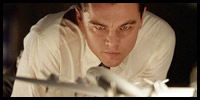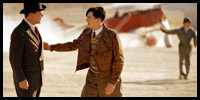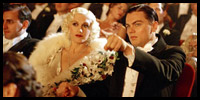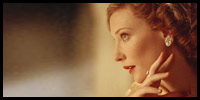
 |
|
The Aviator (2004) Cast: Leonardo DiCaprio, Cate Blanchett, Kate Beckinsale, John C. Reilly, Alec Baldwin, Alan Alda, Ian Holm, Kelli Garner, Matt Ross, Adam Scott, Danny Huston, Brent Spiner, Jude Law, Gwen Stefani, Frances Conroy, Willem Dafoe, Josie Maran, Edward Herrmann, Amy Sloane, Jacob Davich, Rufus Wainwright 2004 – 169 minutes Rated: Reviewed by Dustin Putman, December 2, 2004.  For acclaimed filmmaker Martin Scorsese (2002's "Gangs of New York"), "The Aviator"—a late-in-the-year bid for Oscar glory—arrives as something of a disappointment. As a 169-minute cinematic biopic, a genre that has recently risen in popularity and output, this glossy telling of a twenty-year portion of Howard Hughes' life is not as by-the-numbers as Taylor Hackford's "Ray" and is certainly more narratively cohesive than Oliver Stone's hideous "Alexander." Superiority over such underwhelming efforts is no great shake, but "The Aviator," at least, is sparklingly acted, exquisitely photographed, and keeps lazy sentimentality to a bare minimum. Scorsese has made many iconic classics in his career—1976's "Taxi Driver," 1980's "Raging Bull," etc.—but "The Aviator" can only place at the lower-echelon of his favorable works, due in large part to a bloated running time that overstays its welcome even as it can't fully do justice to its human subject. Judged on its own accord and forgetting who the maker is, however, the film is a solid, albeit flawed, effort.
For acclaimed filmmaker Martin Scorsese (2002's "Gangs of New York"), "The Aviator"—a late-in-the-year bid for Oscar glory—arrives as something of a disappointment. As a 169-minute cinematic biopic, a genre that has recently risen in popularity and output, this glossy telling of a twenty-year portion of Howard Hughes' life is not as by-the-numbers as Taylor Hackford's "Ray" and is certainly more narratively cohesive than Oliver Stone's hideous "Alexander." Superiority over such underwhelming efforts is no great shake, but "The Aviator," at least, is sparklingly acted, exquisitely photographed, and keeps lazy sentimentality to a bare minimum. Scorsese has made many iconic classics in his career—1976's "Taxi Driver," 1980's "Raging Bull," etc.—but "The Aviator" can only place at the lower-echelon of his favorable works, due in large part to a bloated running time that overstays its welcome even as it can't fully do justice to its human subject. Judged on its own accord and forgetting who the maker is, however, the film is a solid, albeit flawed, effort.
 Obtaining some biographical knowledge of Howard Hughes prior to viewing the picture will prove beneficial, as "The Aviator," written by John Logan (2003's "The Last Samurai"), is not particularly thorough in its treatment. Save for a brief prologue between child and mother that suggests the root of his germaphobic condition that plagued him as an adult, background information—including his billionaire father, his education, and his first wife—are passed over with nary a mention in sight. As the film gets underway in earnest, the time is 1927, and 21-year-old Howard Hughes (Leonardo DiCaprio), who inherited his late father's fortune once he turned 18, is already in the midst of producing the Hollywood spectacle, "Hell's Angels," a multimillion dollar-budgeted aviation drama that, in his perfectionism, will take him three years to make. A ladies' man who romances the likes of glamorous movie stars Katharine Hepburn (Cate Blanchett) and Ava Gardner (Kate Beckinsale), Hughes' foremost passion remains his piloting. Set on making flying a commercial means of transportation, he creates Trans-World Airlines, much to the chagrin of PanAm owner Juan Trippe (Alec Baldwin), and breaks the flight speed record by creating a military plane that moves at nearly 400mph. Amidst his successes, Howard Hughes is increasingly plagued by his fear of germs and Obsessive-Compulsive behavior, an illness he must face head-on when he is forced to sit before the Senate for failure to meet his World War II contracts.
Obtaining some biographical knowledge of Howard Hughes prior to viewing the picture will prove beneficial, as "The Aviator," written by John Logan (2003's "The Last Samurai"), is not particularly thorough in its treatment. Save for a brief prologue between child and mother that suggests the root of his germaphobic condition that plagued him as an adult, background information—including his billionaire father, his education, and his first wife—are passed over with nary a mention in sight. As the film gets underway in earnest, the time is 1927, and 21-year-old Howard Hughes (Leonardo DiCaprio), who inherited his late father's fortune once he turned 18, is already in the midst of producing the Hollywood spectacle, "Hell's Angels," a multimillion dollar-budgeted aviation drama that, in his perfectionism, will take him three years to make. A ladies' man who romances the likes of glamorous movie stars Katharine Hepburn (Cate Blanchett) and Ava Gardner (Kate Beckinsale), Hughes' foremost passion remains his piloting. Set on making flying a commercial means of transportation, he creates Trans-World Airlines, much to the chagrin of PanAm owner Juan Trippe (Alec Baldwin), and breaks the flight speed record by creating a military plane that moves at nearly 400mph. Amidst his successes, Howard Hughes is increasingly plagued by his fear of germs and Obsessive-Compulsive behavior, an illness he must face head-on when he is forced to sit before the Senate for failure to meet his World War II contracts.
 Taking place almost entirely between the years of 1927 and 1947, "The Aviator" keeps its time-frame narrow in order to fit within a three-hour running time, but neglects to acknowledge his life as a whole. After all, Howard Hughes lived well into the 1970s—some 28 years past the film's timeline—and a jarring lack of even any end credits postscript on what happened next concludes things on an anticlimactic, admittedly dissatisfying note. Furthermore, it occasionally crystallizes all too glaringly that a significant portion of footage, events, and three-dimensional character strokes have found their way to the cutting-room floor.
Taking place almost entirely between the years of 1927 and 1947, "The Aviator" keeps its time-frame narrow in order to fit within a three-hour running time, but neglects to acknowledge his life as a whole. After all, Howard Hughes lived well into the 1970s—some 28 years past the film's timeline—and a jarring lack of even any end credits postscript on what happened next concludes things on an anticlimactic, admittedly dissatisfying note. Furthermore, it occasionally crystallizes all too glaringly that a significant portion of footage, events, and three-dimensional character strokes have found their way to the cutting-room floor.
 The storytelling is choppy at times, no more so than in the clunky, ineffective treatment of Hughes' relationship with starlet Ava Gardner. Director Martin Scorsese forgets to establish that they are a romantic item before he stages an argument between them as if they have been together for some time, and Ava pops in and out of the story with no sensical fluidity. Kate Beckinsale's (2004's "Van Helsing") inspired work as Ava is wasted on one of the more emptily developed and handled major characters in the film. The forward momentum of the plot and pacing achieved nicely for the first two hours also stumbles in the third act, overstaying its welcome as the Senate's investigation into Hughes gets underway just when the film seems like it should be coming to a close. To be fair, the trial scenes, arbitrary as they are, do offer some bite in the back-and-forth banter between Hughes and crooked Senator Ralph Brewster (Alan Alda).
The storytelling is choppy at times, no more so than in the clunky, ineffective treatment of Hughes' relationship with starlet Ava Gardner. Director Martin Scorsese forgets to establish that they are a romantic item before he stages an argument between them as if they have been together for some time, and Ava pops in and out of the story with no sensical fluidity. Kate Beckinsale's (2004's "Van Helsing") inspired work as Ava is wasted on one of the more emptily developed and handled major characters in the film. The forward momentum of the plot and pacing achieved nicely for the first two hours also stumbles in the third act, overstaying its welcome as the Senate's investigation into Hughes gets underway just when the film seems like it should be coming to a close. To be fair, the trial scenes, arbitrary as they are, do offer some bite in the back-and-forth banter between Hughes and crooked Senator Ralph Brewster (Alan Alda).
 Lest it seem like a problem-riddled wash, "The Aviator" actually has enough veritably strong elements to easily raise it above mediocrity. For one, Scorsese is a brilliant craftsman, and knows just how to set up and play his sequences in an intelligent manner that neither condescends to viewers nor mugs preciously in the name of lame, audience-pleasing comic relief. Laughs that are had are fully earned and sneakily understated rather than broad, acting to humanize and compliment the drama within the scenes. The cinematography by Robert Richardson (2003's "Kill Bill: Vol. 1") is exquisite, marrying bright, vivid colors that recall the cinema of the '30s/'40s era with other scenes that, in their subtle, dark-blue-tinted lusciousness, take on the appearance of moody noir filmmaking. The gritty portrayal of Hughes' illnesses—at one point, he locks himself in his room as a desperate means to keep all germs out—also rings resoundingly true. Finally, the large-scale sequence in which Hughes narrowly escapes death when his jet crashes into a Beverly Hills neighborhood is absolutely chilling, the suspected CGI effects seamlessly integrated with the live-action to depict a plane accident startlingly, believably real.
Lest it seem like a problem-riddled wash, "The Aviator" actually has enough veritably strong elements to easily raise it above mediocrity. For one, Scorsese is a brilliant craftsman, and knows just how to set up and play his sequences in an intelligent manner that neither condescends to viewers nor mugs preciously in the name of lame, audience-pleasing comic relief. Laughs that are had are fully earned and sneakily understated rather than broad, acting to humanize and compliment the drama within the scenes. The cinematography by Robert Richardson (2003's "Kill Bill: Vol. 1") is exquisite, marrying bright, vivid colors that recall the cinema of the '30s/'40s era with other scenes that, in their subtle, dark-blue-tinted lusciousness, take on the appearance of moody noir filmmaking. The gritty portrayal of Hughes' illnesses—at one point, he locks himself in his room as a desperate means to keep all germs out—also rings resoundingly true. Finally, the large-scale sequence in which Hughes narrowly escapes death when his jet crashes into a Beverly Hills neighborhood is absolutely chilling, the suspected CGI effects seamlessly integrated with the live-action to depict a plane accident startlingly, believably real.
 Above all, what steals "The Aviator" away from everything and everyone else is Cate Blanchett's (2003's "The Missing") flawless, eerily uncanny turn as Katharine Hepburn, a spirited actress who treats her own life as if it were her greatest movie performance. Blanchett, much like Jamie Foxx as Ray Charles but perhaps even more so, doesn't just mimic her non-fictional alter ego but actually seems to become her in every way. From physical appearance to mannerisms to speech, Blanchett has unmistakably channeled into Katharine Hepburn's very aura, creating a masterful, Oscar-worthy performance with a depth and sympathy that is missing from Kate Beckinsale's Ava Gardner. Her final scene with Leonardo DiCaprio (2002's "Catch Me If You Can"), marvelously versed as the ambitious but haunted Howard Hughes, as she attempts to lure him outside of the room he has locked himself in so she can talk to him face-to-face one last time, is devastating. Blanchett ably embodies the pain and regret of this woman who has taken another husband for the profit of her career and at the expenditure of her heart.
Above all, what steals "The Aviator" away from everything and everyone else is Cate Blanchett's (2003's "The Missing") flawless, eerily uncanny turn as Katharine Hepburn, a spirited actress who treats her own life as if it were her greatest movie performance. Blanchett, much like Jamie Foxx as Ray Charles but perhaps even more so, doesn't just mimic her non-fictional alter ego but actually seems to become her in every way. From physical appearance to mannerisms to speech, Blanchett has unmistakably channeled into Katharine Hepburn's very aura, creating a masterful, Oscar-worthy performance with a depth and sympathy that is missing from Kate Beckinsale's Ava Gardner. Her final scene with Leonardo DiCaprio (2002's "Catch Me If You Can"), marvelously versed as the ambitious but haunted Howard Hughes, as she attempts to lure him outside of the room he has locked himself in so she can talk to him face-to-face one last time, is devastating. Blanchett ably embodies the pain and regret of this woman who has taken another husband for the profit of her career and at the expenditure of her heart.
 Headlined by the stellar work of Leonardo DiCaprio, who is able to rise above the hindrances that are his baby-faced looks to personify a man of equal parts power, ambition, and emotional weakness, "The Aviator" is a technical triumph as well as a creative one for its effortless actors, most of whom run with their parts when they aren't being pushed to the sidelines. Ultimately, as an in-depth account of Howard Hughes, Scorsese isn't quite as assured, dropping vast stretches of material and never figuring out how to juggle the rest of the puzzle pieces of his life into a manageable length. Even if viewers leave "The Aviator" frustratingly uninformed on the man's earlier and later years—and even some of the years in between—they will certainly have a better idea of who he was at his core and why he remains a figure of great historical relevance. This fact, and the standout force of nature that is Cate Blanchett, finally tips the shaky scales in Scorsese's favor.
Headlined by the stellar work of Leonardo DiCaprio, who is able to rise above the hindrances that are his baby-faced looks to personify a man of equal parts power, ambition, and emotional weakness, "The Aviator" is a technical triumph as well as a creative one for its effortless actors, most of whom run with their parts when they aren't being pushed to the sidelines. Ultimately, as an in-depth account of Howard Hughes, Scorsese isn't quite as assured, dropping vast stretches of material and never figuring out how to juggle the rest of the puzzle pieces of his life into a manageable length. Even if viewers leave "The Aviator" frustratingly uninformed on the man's earlier and later years—and even some of the years in between—they will certainly have a better idea of who he was at his core and why he remains a figure of great historical relevance. This fact, and the standout force of nature that is Cate Blanchett, finally tips the shaky scales in Scorsese's favor.
|
© 2004 by Dustin Putman |














